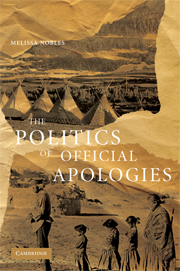Book contents
- Frontmatter
- Contents
- Preface and Acknowledgments
- 1 Toward a Membership Theory of Apologies
- 2 History of National Memberships in Australia, Canada, New Zealand, and the United States
- 3 To Apologize or Not to Apologize: National Histories and Official Apologies
- 4 Beyond Sentiment? Apologies and Their Effects
- 5 The Weight of History and the Value of Apologies
- Appendix: Twentieth- and Twenty-First-Century Public Apologies
- Bibliography
- Index
Preface and Acknowledgments
Published online by Cambridge University Press: 24 May 2010
- Frontmatter
- Contents
- Preface and Acknowledgments
- 1 Toward a Membership Theory of Apologies
- 2 History of National Memberships in Australia, Canada, New Zealand, and the United States
- 3 To Apologize or Not to Apologize: National Histories and Official Apologies
- 4 Beyond Sentiment? Apologies and Their Effects
- 5 The Weight of History and the Value of Apologies
- Appendix: Twentieth- and Twenty-First-Century Public Apologies
- Bibliography
- Index
Summary
The Turkish government's insistence on denying the Armenian genocide – specifically article 301 of Turkey's penal code, which authorities have used to interpret discussion of the genocide as an insult to “Turkishness” – has garnered a great deal of attention here in the United States and in Europe. The press, lawmakers, and political pundits present such Turkish insistence as excessive, an assault on free speech and creative thought, and, most seriously, an assault on truth itself. Indeed, in October 2006, the French Assembly passed a law that makes denial of the genocide a crime, presumably to counteract and highlight the wrong of Turkish historical and moral denial. (The law must still be approved by the French Senate and president.) The press writes sympathetically of Armenians' desire to have their stories told and history known.
If these collective reactions are to be believed, it is as if Turkey's behavior is somehow incomprehensible to Europeans and Americans. But continuing debates in France about the Algerian War, for example, or the deafening silence about the experiences of Native Americans tell another story. Of course, most countries' behaviors are far closer to Turkey's than they or we would care to admit. Governments and citizenries have many reasons to ignore or deny historical injustices, and they have long done so, in perhaps more subtle but no less effective ways than Turkey has. Like many aggrieved groups, Armenians have long asked for acknowledgment and even apology. Their demands are often met with mixed reactions.
- Type
- Chapter
- Information
- The Politics of Official Apologies , pp. ix - xivPublisher: Cambridge University PressPrint publication year: 2008

